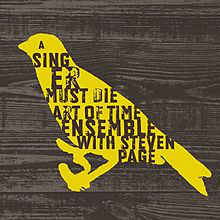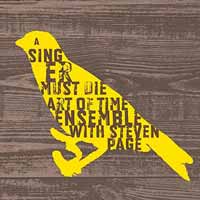If you’re a Steven Page fan or a Barenaked Ladies nut, I have something special for you. But first, read about the release of Page’s first solo album since his departure from BNL.
In June of 2008, I heard the Art of Time Ensemble perform with Steven Page at Harbourfront Centre in Toronto. It was part of their Songbook series, an annual event where Andrew Burashko and the Art of Time Ensemble invite a well known Canadian artist to select a handful of favourite songs. They commission arrangements of the selected favourites and then get together for a bit of a party. CBC Radio 2 recorded the concert and it was broadcast in July of 2008 but wasn’t included on Radio 2’s Concerts on Demand roster because they ended up cooking an album with Jonathan Goldsmith as producer. Here is a list of tracks and original composers:
1. LION’S TEETH / THE MOUNTAIN GOATS
2. I WANT YOU / ELVIS COSTELLO
3. FOOLISH LOVE / RUFUS WAINRIGHT
4. RUNNING OUT OF INK / BARENAKED LADIES
5. A SINGER MUST DIE / LEONARD COHEN
6. THE TAXI RIDE / JANE SIBERRY
7. TONIGHT WE FLY / THE DIVINE COMEDY
8. VIRTUTE THE CAT EXPLAINS HER DEPARTURE / THE WEAKERTHANS
9. FOR WE ARE THE KING OF THE BOUDOIR / THE MAGNETIC FIELDS
10. PARANOID ANDROID / RADIOHEAD
Reviews are mixed. Keith Carman for Metro Canada is modestly receptive, giving the album a 3.5 stars but posting reservations: Page is reaching beyond his abilities in covers of the Weakerthans and Radiohead, and the whole project pushes him outside his comfort zone. Kirk Heron of Eye Weekly gives it just two stars, referring to “Steven Page’s overwhelmingly goofy voice”, saying that “the vocalist is still leashed to his not-so-serious Barenaked Ladies roots” and (in reference to the Radiohead cover) describing his voice as a “tin-can phone” above the beautiful arrangement.
Heron’s review is unfair. The “overwhelmingly goofy voice” comment is ignorant and the only thing leashing Page to his “not-so-serious Barenaked Ladies roots” is public perception, a perception that reviewers like Heron only serve to perpetuate. A little bit of scandal and a split from the Ladies may have the unintended benefit of helping Page transform himself into a “serious” musician. However, such a suggestion would merely cloud the fact that Page has always been a serious musician. Since his earliest days with the Barenaked Ladies, Page has been the melancholic, the darker figure who has kept the Ladies from a descent into Raffi hell by touching on themes like depression (think of “Brian Wilson” from Gordon), alcohol (“Alcohol” from Stunt) and drugs and suicide (“War on Drugs” from Everything to Everyone).
The selections on A Singer Must Die reflect that darkness. A simple survey of key signatures reveals a preference for the minor key (“Lion’s Teeth”, “I Want You”, “The Taxi Ride”, and “Paranoid Android”). And some, like “A Singer Must Die”, while written in a major key, spend a lot of time in the realm of III, VI & II, which gives them an indeterminate feel. Then there are the themes. Even Neil Hannon‘s exhilarating “Tonight We Fly” lies embedded in a weighty philosophy (one that eschews god and survival of the soul, and calls us to live as if this life is the only chance we have to get things right).
As for orchestration, Page has always performed above more sounds than you find in a typical five-piece garage band. In the Barenaked Ladies, there was always Jim Creeggan playing his double bass, cello and even the viola. Their 1991 cover of Bruce Cockburn’s “Lovers in a Dangerous Time” is an early example of an effective string accompaniment. And woodwinds have often figured in their music. So the presence of a fuller orchestration seems a natural extension of earlier efforts. Jane Siberry’s “The Taxi Ride” lends itself particularly well to the Art of Time’s instrumental accompaniment. The most challenging piece (for the listener) is “For we are the King of the Boudoir” by the Magnetic Fields because the accompaniment gradually descends into dissonance and concludes with Page’s “tin-can phone.” It isn’t pop music and it isn’t listenable in the way that top 40 music makes for pleasant background music on the drive to work, so I can understand why Heron might not have liked it. Nevertheless, the fact that we don’t like something does not, therefore, make it bad. My suspicion is that the music here doesn’t challenge Page as much as it challenges the expectations of his listeners.
As I mentioned at the outset, I have something special for you. I offer it to counter the suggestion from Keith Carman that with A Singer Must Die Steven Page is working outside his comfort zone. In fact, my impression is that Page is only beginning to move into his comfort zone and it is work with the Barenaked Ladies that has kept him from pursuing projects that are truer to his own inclinations.
The best way to gauge one’s comfort zone is by what one plays when the audience isn’t paying attention. A few years ago I caught Page making music in the living room of a farmhouse in rural Ontario. There’d been some fiddling to a piano accompaniment, so Page pulled out his guitar and joined in. Then he stuck a piece of sheet music on a stand, and started to sing. The audio isn’t great because I pulled it from a camcorder and there’s a lot of talking in the background. But the point isn’t the quality of the audio. The point is his choice of music. He sang “Love is the Sweetest Thing,” Ray Noble‘s No. 1 hit from 1933. Not surprising then that he selected Rufus Wainwright’s “Foolish Love” which is written in a similar style. Maybe this is Steven Page’s comfort zone. Enjoy:

